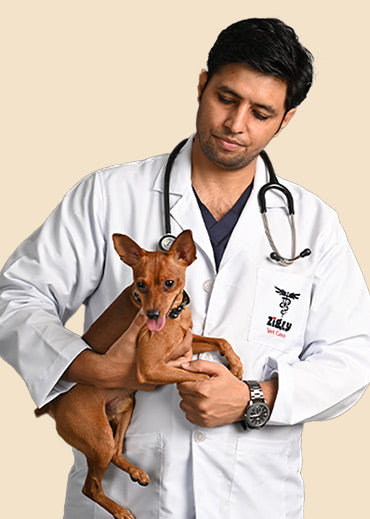When it comes to pet care, good intentions aren’t always backed by accurate information. From outdated advice passed down through generations to viral social media claims, pet parents often hear and unknowingly believe myths that could compromise their furry friend’s health. These misconceptions can delay treatment, create anxiety, or even lead to unnecessary suffering.
Veterinarians see the effects of these myths every day. So we’re setting the record straight. Here are 9 common pet health myths that vets wish more people understood and stopped believing.
1. “If my pet is eating and active, they must be healthy.”
Not always.
Pets are masters of hiding discomfort and illness, especially cats and stoic dog breeds. Just because your pet is eating or playing doesn’t mean they’re in perfect health. Many chronic conditions (like kidney disease, dental issues, or early-stage arthritis) can progress silently.
Regular checkups, routine bloodwork, and dental exams can catch issues before they become visibly serious. Don’t wait for obvious symptoms, prevention is part of the care.
2. “A warm, dry nose means my dog is sick.”
This is one of the most persistent myths. In reality, a dog’s nose can change texture and temperature for many harmless reasons, such as lying in the sun, sleeping, or dry indoor air. A warm or dry nose isn’t a reliable indicator of health.
Instead, look for more consistent signs like changes in appetite, behavior, breathing, or energy levels. Your vet will assess temperature using a thermometer, not your hand.
3. “Pets don’t need dental care.”
Many pet parents overlook oral health, thinking bad breath is normal or that animals don’t need brushing. But vets often find severe dental disease in pets as young as three. Plaque buildup, gum disease, and tooth decay can lead to pain, infection, and even heart or kidney problems.
Routine dental cleanings and brushing at home (with pet-safe toothpaste) can significantly improve quality of life and prevent costly procedures later.
4. “Indoor pets don’t need vaccinations or parasite control.”
It’s easy to assume that indoor cats or dogs are safe from fleas, ticks, and disease. But insects can still enter your home, and you may unknowingly bring contaminants in from outside. Indoor pets can also escape, interact with visiting animals, or require boarding or grooming each exposing them to risk.
Core vaccinations and preventive treatments are crucial, regardless of lifestyle. Always follow your vet’s recommendations for vaccination and deworming schedules.
5. “It’s okay to give my pet over-the-counter human medications.”
Absolutely not. Some human medicines, like ibuprofen, paracetamol, or aspirin, are toxic or even fatal to dogs and cats. Even medications that seem harmless in small doses can cause liver or kidney failure, stomach ulcers, or neurological issues.
Always consult your vet before giving any medication even natural or herbal supplements. What helps a human might seriously harm a pet.
6. “Scratching means fleas.”
Fleas are common, but they’re not the only reason a pet might scratch. Itching could stem from allergies (to food, pollen, or dust), dry skin, fungal infections, or even anxiety. Conversely, some pets have fleas but show few symptoms.
It’s important to identify the root cause before treating. A vet can help rule out various conditions and recommend the right course of action.
7. “My pet will stop eating when they’re full, so free feeding is fine.”
Some pets, especially certain dog breeds, don’t have a reliable “off switch” when it comes to food. Free feeding can lead to obesity, digestive issues, and behavioral problems. On the other hand, underfeeding or erratic meal times can cause malnutrition or anxiety.
Structured feeding with portion control based on your pet’s weight, breed, and activity level is best. Your vet can help you design the right meal plan and feeding schedule.
8. “Pets eat grass because they’re sick.”
While some pets do eat grass to induce vomiting, many simply enjoy the taste or texture. Occasional grass chewing isn’t necessarily a sign of illness. However, if it’s happening frequently or followed by vomiting, it’s worth investigating digestive issues or nutritional deficiencies.
Avoid grass treated with pesticides, and talk to your vet if the behavior becomes obsessive or changes suddenly.
9. “If my pet looks healthy, we can skip the annual vet visit.”
Just like humans, pets need regular checkups even when they seem fine. Annual vet visits aren’t just about vaccinations; they allow for early detection of hidden conditions, routine blood tests, dental exams, and discussions around behavior or nutrition.
Skipping these visits can delay diagnosis and treatment, leading to more serious and expensive problems down the line.
Conclusion
It’s completely natural to Google symptoms or seek advice from fellow pet parents online. But when it comes to health, your veterinarian is the most reliable and qualified source. Myths may sound comforting or convenient, but they can have real consequences.
That’s where Zigly Vet care comes in.
At Zigly, we don’t just treat, we educate. Our vets are here to help you understand your pet’s unique needs with clarity and compassion. We bust myths, offer real solutions, and ensure your pet gets nothing but the best in preventive and advanced care.
So the next time you hear “they say…” about pet health, pause, and ask a Zigly vet instead.
Because your pet deserves care rooted in facts, not folklore. Visit your nearest Zigly Experience Centre for more.




